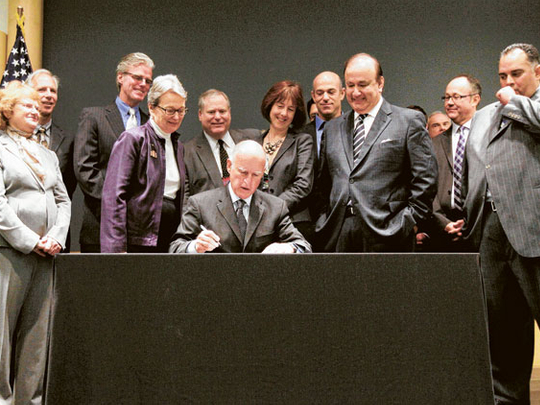
Sacramento: Amazon.com Inc. will change the way it does business, at least in California, now that Governor Jerry Brown has signed into law a bill that requires the giant internet retailer and certain out-of-state online merchants to collect sales taxes on purchases by Californians.
Starting next September 15, Amazon and many other Internet retailers will lose their ability to offer essentially a savings to customers by skipping the levy of 7.25 per cent or more, which bricks-and-mortar stores and other merchants must collect.
Brown signed the measure on Friday at the San Francisco headquarters of Gap Inc., a clothing manufacturer that backed the legislation. The new law supplants a similar one that Amazon had been challenging since it took effect on July 1.
Abandoning its fight to avoid collecting sales taxes, Amazon now seeks to build what Paul Misener, a company vice-president, called "a lasting partnership with the state."
The Seattle company, he said, plans to spend $500 million to open large distribution centres and other facilities in California that would create 10,000 full-time jobs — ones that carry such benefits as health insurance.
The new law was hammered out in a compromise among lawmakers, the retail industry and online merchants, mainly Amazon and auction house EBay Inc. The compromise, Brown said, showed that bipartisan efforts to boost jobs and the economy are possible to achieve and that "a prolonged, costly ballot battle is a benefit to no one."
With the tax fight behind it, Amazon must come up with new ways to ensure that its customers keep clicking "add to cart" to buy tens of thousands of items as varied as books, plumbing supplies and furniture. One idea, marketing experts suggested, might be to use the expanded distribution network to deliver merchandise in just hours instead of days.
"They will be forced to innovate," said Anthony Dukes, a USC marketing professor. Under the Internet sales tax law, he said, Amazon will have to work harder to attract shoppers, "which could be good for all of us." In California, a state that analysts say accounts for about 15 per cent of Amazon's US sales, the deals offered by the world's largest online retailer won't seem quite as attractive as they have been since Amazon opened 17 years ago.
But the company still would be competitive, analysts said. For many products, Amazon charges 5 per cent to 6 per cent less than the prices of the same goods in stores or on other websites, even when sales tax is added, according to a July 21 study by Chicago investment firm William Blair & Co. Amazon would not discuss possible changes in its business model other than opening new distribution centres in California. Spokeswoman Mary Osako said the company was "obsessed with our customers."
In fighting the previous law, Amazon avoided any contacts with the state, such as having offices, employees and contract workers in California. It even severed ties with some 10,000 affiliated websites in California in June.
Under a 1992 US Supreme Court decision, companies based elsewhere that have no contact with the state don't have to collect sales taxes from customers in the state. But as Amazon has grown, it also has been looking at how it does business, analysts said.
"Amazon can offer a fuller array of services like same-day delivery and Amazon Fresh, which is its grocery delivery," said Jordan Rohan, an Internet analyst at investment bank Stifel, Nicolaus & Co. "Amazon could certainly expand services if it had local distribution."










